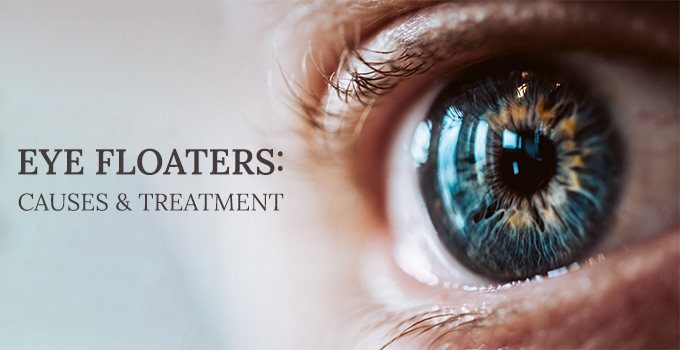Understanding Eye Floaters: Causes, Symptoms, and Treatment Options
Eye floaters, also known as muscae volitantes, are tiny spots or threads that float across your visual field, seemingly without reason. These small specks or shadows can be annoying or even distracting, but for the most part, they are harmless. However, in some cases, they can signal a more serious eye condition.

In this article, we will discuss the causes, symptoms, and treatment options for eye floaters.
Causes of Eye Floaters
Eye floaters are often caused by changes in the jelly-like substance called the vitreous that fills the inside of the eye. As we age, the vitreous can become more liquid and shrink, leading to the formation of clumps or strands. These clumps cast shadows on the retina, which we perceive as floaters.
Other causes of eye floaters include inflammation in the eye, injury, or retinal tears. In rare cases, eye floaters can be a sign of a more serious condition, such as a retinal detachment or bleeding in the eye.
Symptoms of Eye Floaters
Eye floaters are typically described as small spots or specks that move around in your field of vision. They can appear as dark or transparent threads, webs, or blobs. Floaters are often more noticeable in bright light or against a plain background, such as a white wall or blue sky.
In most cases, eye floaters are harmless and do not require treatment. However, if you suddenly see a large number of floaters or if you notice flashes of light in your peripheral vision, this could be a sign of a more serious eye condition, such as a retinal detachment. Other symptoms that may indicate a more serious condition include sudden vision loss or a curtain-like shadow over your field of vision. If you experience any of these symptoms, it is important to seek medical attention right away.
Treatment Options for Eye Floaters
For the most part, eye floaters do not require treatment. Many people learn to live with them over time, as they tend to become less noticeable as the brain adapts to their presence. However, if floaters are particularly bothersome or if they are interfering with your daily activities, there are several treatment options available.
One option is laser therapy, which involves using a laser to break up the clumps in the vitreous that are causing the floaters. This procedure is typically performed on an outpatient basis and is considered safe and effective.
Another option is vitrectomy, which involves removing the vitreous from the eye and replacing it with a saline solution. This procedure is more invasive than laser therapy and carries a greater risk of complications, such as cataracts and retinal detachment. However, it is often more effective at reducing floaters than laser therapy.
Preventing Eye Floaters
While there is no surefire way to prevent eye floaters, there are several steps you can take to reduce your risk. These include:
- Protecting your eyes from injury by wearing safety glasses when participating in sports or other activities that pose a risk of eye injury.
- Controlling underlying health conditions, such as diabetes or high blood pressure, can increase your risk of eye floaters.
- Eating a healthy diet that is rich in antioxidants and other nutrients that support eye health.
- Avoiding smoking and excessive alcohol consumption, which can damage the eyes and increase the risk of eye floaters.
Conclusion
Eye floaters are a common condition that affects many people as they age. While they are typically harmless, they can be annoying or distracting. In some cases, eye floaters can be a sign of a more serious eye condition, so it is important to seek medical attention if you experience sudden changes in your vision. While there is no cure for eye floaters, there are several treatment options available that can reduce their impact on your daily life.
One of the best ways to prevent eye floaters is to take good care of your eyes. This includes protecting them from injury, controlling underlying health conditions that can increase your risk of floaters, and eating a healthy diet that supports eye health. By following these simple steps, you can reduce your risk of eye floaters and other eye conditions, and enjoy clear, healthy vision for years to come.
In conclusion, eye floaters are a common and often harmless condition that can be a nuisance for some people. While they do not usually require treatment, it is important to seek medical attention if you experience sudden changes in your vision, as this could be a sign of a more serious eye condition. With proper care and treatment, you can reduce the impact of eye floaters on your daily life and enjoy clear, healthy vision.